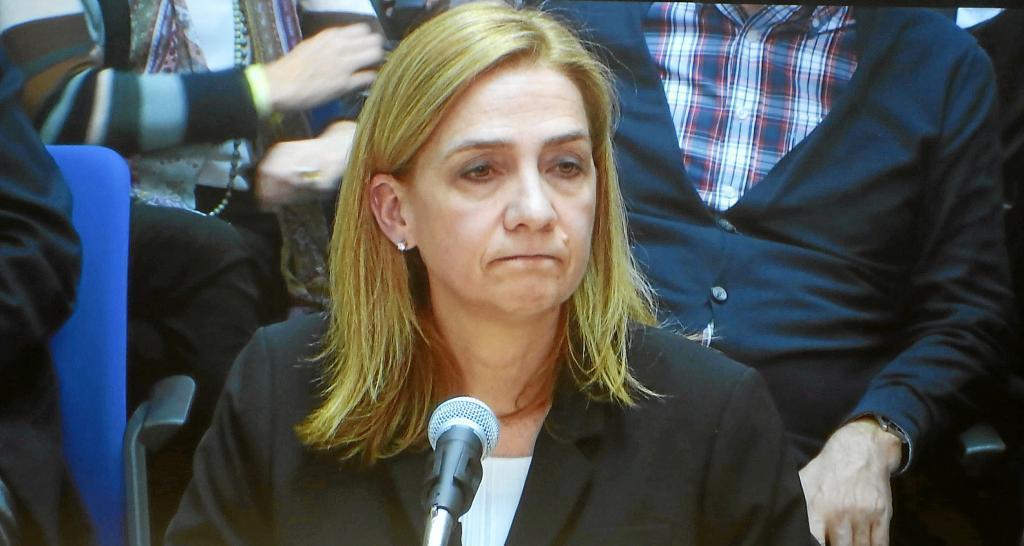A princess in court
The trial into the affairs of the former Duke of Palma's Instituto Nóos lost a day last week because of the public holiday on Tuesday. The three days of proceedings were enough, however, to bring the questioning of Iñaki Urdangarin to an end and for his wife, Princess Cristina, to make her long-anticipated appearance. Of Urdangarin, we learned on Thursday that he had charged 710,000 euros plus IVA for arranging sports forums. The amounts were justified, he said, because they were "in line with what a consultant from the Esade business school could expect".
His questioning had lasted in all for some sixteen hours. By contrast, the princess appeared for only one hour. As reported on Friday, she exercised her right to remain silent in face of questions from the union Manos Limpias, which has brought the private prosecution against her. She did reply to questions from her lawyer, Pau Molins, saying that she had become a co-owner of a separate company, Aizoon, that is a key aspect of the whole case, because her husband had asked her to be and that this was a matter of trust on his behalf. She denied having any involvement with the management of the company.
Molins was to find himself in a spot of hot water. Yesterday, we reported that Manos Limpias had taken exception to what he had said in a radio interview regarding its political nature and its backing. Molins had wondered where the funding came from to allow a prosecution to take place. "This costs a lot of money." Manos Limpias said that it was considering legal action for slander.
Brexit rumbles on
Brexit remained firmly at the centre of attention, an online petition having been signed by sufficient numbers (10,000, as our Wednesday front page revealed) to demand a response from David Cameron for the right of UK foreign residents to have a vote in the referendum. Earlier in the week, the UK's Minister for Europe, David Lidington, had said that Brexit would mean that UK citizens would no longer be able to move to Spain or other EU countries. He was accused, in this paper, of indulging in the "tactics of fear". Jason Moore was to say on Thursday that a meeting of experts a year or so ago had suggested that a UK departure from the EU would have little or no impact on foreign residents currently in situ. Where things might get complicated would be with those wishing to move if the UK were indeed to leave. Meanwhile, there were no answers, only questions as concerned foreign residents wondered about issues such as pensions and health care.
Failed investiture votes
Spain still has an acting government. The attempt by Pedro Sánchez of PSOE to form a new government failed when he twice lost votes on his investiture as prime minister. The vote on both occasions produced 219 deputies in Congress in the "no" camp. The 130 saying "yes" was increased by only one the second time round. Otherwise, the investiture debates on Wednesday and Friday were marred by insults.
Holiday rentals: a complex issue
A familiar issue returned to the spotlight: holiday rentals. Thursday's front cover said that the Balearic government was wanting to regulate "illegal" holiday rentals. What this means is that the government wishes to apply some control to a situation that is out of control, especially where the holiday renting of apartments is concerned. Legislation is expected within six months, and we applauded the fact that the government is planning to involve websites in its drafting. "It is preferable to make these businesses part of the solution and not keep them on the outside as the problem."
It is, though, an awkward matter on which to legislate. And as Sue Parrish observed in a comment on this website, she would rather not have tourists in her own backyard (so to speak) as an owner in an apartment block of 38 where some 75% are already rented out touristically (which would mean either illegally as defined by the Balearic tourism law or legally under the terms of the tenancy act). For once though, this is a matter which has general all-party support, even from the Partido Popular, which had spent its period in office from 2011 to 2015 refusing to countenance any possible liberalising of the market for holiday apartments.


1 comment
To be able to write a comment, you have to be registered and logged in
David Lidington make more money on expenses that his salary...he had to refund the taxpayer for his toothpaste bill... !!!